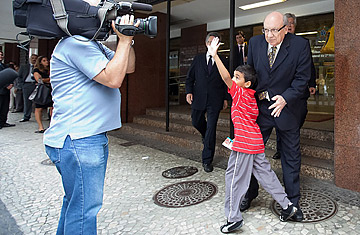
A boy waves to a video camera as Sergio Tostes, right, lawyer of the Bianchi family, leaves a federal court after the hearing on Dec. 16, 2009.
It's hard to watch the judicial farce playing out in Brazil right now and not remember the one that began during the holiday season here in Miami 10 years ago. Brazil's Supreme Court on Thursday halted the return of nine-year-old Sean Goldman to his American father — even though international law clearly dictated that the boy should have been handed over when his mother, who had absconded to South America with the child five years ago, died last year. It sounds a lot like the case of Elián González, the six-year-old Cuban boy who, after washing up in Florida in 1999 after a boat disaster his mother did not survive, was for seven months kept from his father in Cuba by a string of outrageous and politically motivated U.S. court rulings.
The Sean Goldman case sounds so much like the Elián González case, in fact, that Brazil has opened itself to charges of especially egregious hypocrisy. It's no secret that Brazil, especially under hugely popular President Luiz Inácio Lula da Silva, has become a hemispheric counterweight to the U.S. And it loves to play tit-for-tat with Washington. Because Washington still insists Brazilians secure a visa before entering the U.S., Brasilia makes Americans pay for a "reciprocal" permit to get into Brazil; after the U.S. started thumb-printing foreigners in immigration lines after 9/11, Brazil obliged Americans to do the same. Those are understandable counterjabs. But while no one is suggesting that the Brazilian justice system has been keeping Sean from his father as payback for Elián, Americans can't forget how loudly — and rightly — Brazil and the rest of Latin America decried America's violation of international law in the Cuban case.
Which makes it all the more embarrassing that Brazil would play the judicial perpetrator in the Goldman debacle. Sean was a four-year-old toddler in 2004 when his mother, Bruna Bianchi, took him from New Jersey for what was supposed to be a two-week visit to her family in Rio de Janeiro. She instead stayed, filed for a divorce from her husband David Goldman and essentially abducted Sean from him. That's what a U.S. court ruled anyway, ordering that the boy be returned to his father. But a Brazilian court instead granted custody to Bianchi, who remarried.
Remarkably, even after she died in childbirth last year, David still had to fight a legal battle to win custody of Sean from the boy's Rio stepfather. And keep in mind, it isn't as if David barely knows Sean: before the abduction he'd helped raise his son for four years. Most fathers would agree that losing the past five years after that — the first little-league games, reading lessons, trips to Disney World — would have been wrenching. It would have been as if Juan Miguel González had lost Elián for seven years instead of seven months.
A federal court in Rio finally did the right thing last summer and ruled that Sean and David should be reunited. An appellate court upheld that ruling on Wednesday, and David flew to Rio on Thursday hoping to bring Sean back home for Christmas. But in a move that rivals the most disgraceful machinations of the Elián episode, Brazil's Supreme Court ruled as David arrived that the case requires further review. Now, the soonest the father can hope to be reunited with the son, if he can hope for that at all, is February.
To his credit, Lula, like former U.S. President Bill Clinton 10 years ago, backs the father. But what's particularly striking is how Sean's case has been hijacked by local political influence in ways that recall Elián's. A decade ago in Miami it was the Cuban exile lobby, which saw in Eliancito a way to stick it to Fidel Castro. (One local judge, who ruled that Elián's Miami relatives should have custody of him, turned out to be a client of a powerful exile political broker pushing for Elián to remain in the U.S.) Today in Rio it's the politically connected lawyer relatives of Sean's stepfather — and if you think Brazil's admittedly impressive social progress of late means that powerful families can no longer manipulate the courts, especially when poking the U.S. in the eye is at stake, think again. Just as Miami exile leaders were able to make Elián's case drag out for as long as possible (it might still be dragging out today if the feds hadn't finally taken the boy forcibly), the Rio relatives have turned Sean's case into a Brazilian Bleak House.
Brazil may get some "reciprocal" satisfaction from tweaking Americans every now and then (and deservedly so). But this protracted travesty is a reminder that Brazil is no more immune from ugly double standards than America is — even when it comes to a bond as sacred as father and son.
